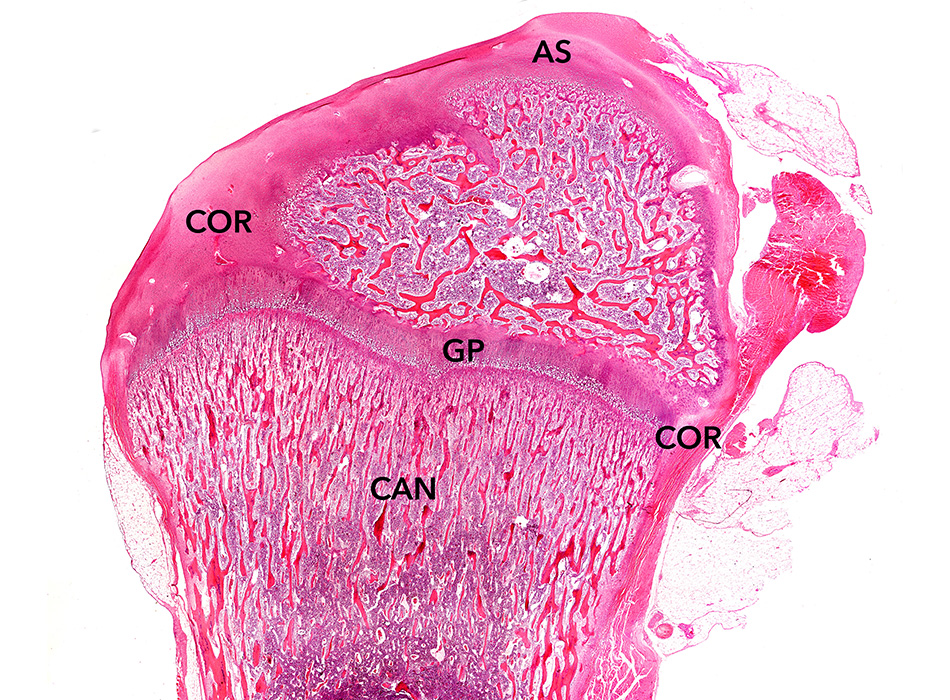



Cross section of a long bone showing the result of endochondral formation. Cortical bone (COR) and cancellous bone (CAN) form inferiorly and superiorly to the articular (joint) surface (AS) from the growth plate (GP).
To understand what role bone graft products In the process of bone fracture repair, it is important to understand the architecture of the bone and the different bone categories involved in the healing process. As with most complex subjects, there are many ways to characterize bone. This blog describes the three main methods of bot categorization.
At the macroscopic level, bone can be classified as either cancellous bone or cortical bone. Synonyms for cancellous bone are trabecular or spongy bone. Cortical bone can be referred to as stretched or compact bone. When you look at bones with the naked eye, you can easily see distinct differences in porosity or density. Cancellous bone tissue is typically found on the inside of the bone, while cortical bone is found on the outside (Figure 1). In a serious bone fracture, both cortical and cancellous bone are often broken.
Cancellous bone porosity typically ranges from 75-95% with an average pore size of 200-600 μm in diameter. This gives it a honeycomb-shaped, spongy appearance and light weight. It is found in the inner chamber of most bones, usually at the ends, near joints. This type of bone is made of beamsThese are curved beams or arches specially arranged to evenly distribute biomechanical loads across the articular surfaces of joints.
The low density of cancellous bone makes it more fragile than cortical bone, but it is also more flexible. In technical terms it has a lower one elastic modulus. This cushioning effect prevents or delays arthritis of the more vulnerable and non-regenerative tissues, especially cartilage or intervertebral discs. The high porosity of cancellous bone also serves as a reservoir for bone marrow, which is essential for the regeneration of a variety of tissues. Finally, cancellous bone serves as a source of storing calcium and phosphorus for use throughout the body.
Unlike cancellous bone, cortical bone is very dense and only 5-10% porous. Therefore, it is heavier in weight. The pores are very small, usually 10-100 μm in diameter. In fact, the pore size of the channels that feed the osteocytes is called channels, are less than 500 nm (0.5 μm). For the most part, the pores of cortical bone are not visible without magnification. These pores are just large enough in diameter to allow blood and lymphatic vessels, as well as nerves, to snake through the cortical bone and support all the osteocytes and other cells in the bone. Due to its high density, cortical bone serves as a hard protective layer around the internal bone marrow cavity and bears most of the biomechanical loads placed on our bones.
Introduction If you're an athlete or someone who leads an active lifestyle, you've likely heard…
Key Takeaways Regular exercise and maintaining a healthy weight are crucial for knee health Proper…
Ever finished a run and felt your knee throbbing? You're not alone. Many athletes face…
https://youtu.be/YRrppL1WuCw Introduction As a weight lifter, you're no stranger to pushing your body to its…
Ever wondered why some hikers seem to move easily on tough trails while others find…
Are you an active person dealing with knee pain that stops you from doing what…